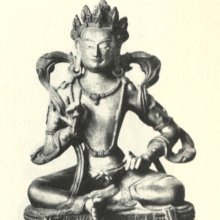Vajradanta, Vajra-danta, Vajradamta: 7 definitions
Introduction:
Vajradanta means something in Hinduism, Sanskrit. If you want to know the exact meaning, history, etymology or English translation of this term then check out the descriptions on this page. Add your comment or reference to a book if you want to contribute to this summary article.
Images (photo gallery)
In Hinduism
Purana and Itihasa (epic history)
Source: Cologne Digital Sanskrit Dictionaries: The Purana IndexVajradanta (वज्रदन्त).—A commander of Bhaṇḍa, who was killed by the Śaktis.*
- * Brahmāṇḍa-purāṇa IV. 21. 77; 23. 46-9.

The Purana (पुराण, purāṇas) refers to Sanskrit literature preserving ancient India’s vast cultural history, including historical legends, religious ceremonies, various arts and sciences. The eighteen mahapuranas total over 400,000 shlokas (metrical couplets) and date to at least several centuries BCE.
Languages of India and abroad
Sanskrit dictionary
Source: DDSA: The practical Sanskrit-English dictionaryVajradanta (वज्रदन्त).—
1) a hog.
2) a rat.
Derivable forms: vajradantaḥ (वज्रदन्तः).
Vajradanta is a Sanskrit compound consisting of the terms vajra and danta (दन्त).
Source: Cologne Digital Sanskrit Dictionaries: Shabda-Sagara Sanskrit-English DictionaryVajradanta (वज्रदन्त).—m.
(-ntaḥ) 1. A hog. 2. A rat. E. vajra a thunder-bolt, (as hard,) danta a tooth.
Source: Cologne Digital Sanskrit Dictionaries: Monier-Williams Sanskrit-English Dictionary1) Vajradanta (वज्रदन्त):—[=vajra-danta] [from vajra > vaj] mfn. ‘hard-tusked’, a hog, boor, [cf. Lexicographers, esp. such as amarasiṃha, halāyudha, hemacandra, etc.]
2) [v.s. ...] a rat, [cf. Lexicographers, esp. such as amarasiṃha, halāyudha, hemacandra, etc.]
Source: Cologne Digital Sanskrit Dictionaries: Yates Sanskrit-English DictionaryVajradanta (वज्रदन्त):—[vajra-danta] (ntaḥ) 1. m. A hog; a rat.
[Sanskrit to German]
Sanskrit, also spelled संस्कृतम् (saṃskṛtam), is an ancient language of India commonly seen as the grandmother of the Indo-European language family (even English!). Closely allied with Prakrit and Pali, Sanskrit is more exhaustive in both grammar and terms and has the most extensive collection of literature in the world, greatly surpassing its sister-languages Greek and Latin.
Kannada-English dictionary
Source: Alar: Kannada-English corpusVajradaṃta (ವಜ್ರದಂತ):—
1) [noun] a strong tooth.
2) [noun] a wild-boar, a hard-tusked animal.
3) [noun] a rat, a rodent.
4) [noun] akind of plant.
Kannada is a Dravidian language (as opposed to the Indo-European language family) mainly spoken in the southwestern region of India.
See also (Relevant definitions)
Partial matches: Vajra, Danta.
Query error!
Full-text: Vacciratantan, Vajra.
Relevant text
Search found 3 books and stories containing Vajradanta, Vajra-danta, Vajradamta, Vajradaṃta; (plurals include: Vajradantas, dantas, Vajradamtas, Vajradaṃtas). You can also click to the full overview containing English textual excerpts. Below are direct links for the most relevant articles:
Paumacariya (critical study) (by K. R. Chandra)
4. Genealogy of the Raksasa Vamsa dynasty < [Chapter 5 - Origin and Genealogy of Various Vamshas]
Agni Purana (by N. Gangadharan)
Lalitopakhyana (Lalita Mahatmya) (by G.V. Tagare)
